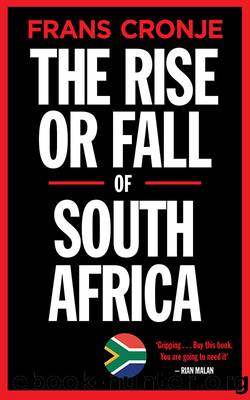The Rise or Fall of South Africa by Frans Cronje

Author:Frans Cronje
Language: eng
Format: epub
Publisher: Tafelberg
Published: 2020-03-29T07:23:33+00:00
Pikettyâs data show that where countries have experienced massive and relatively egalitarian economic growth private wealth has accumulated at an even faster rate than GDP. He shows that after the World Wars in Europe and Japan (and the great depression the US) wealth destruction was so severe that their capital to income ratios were reduced by more than 50% from between 6â9:1 to between 3â2:1. Piketty calls such low ratios a âblank slateâ where wealth has effectively been wiped out and the business of private accumulation must begin afresh. Following their post-war and post-depression booms wealth accumulation in those regions outpaced GDP growth so that they now have capital to income ratios of between 4.5â7:1 â where the process of redistribution can again begin in a stage Marxists typically call âlate capitalismâ.
Even China has the same story to tell. Piketty shows that in 1978 Chinaâs capital/income ratio was about 3.5:1. As wealth accumulation had been stifled, growth stagnated, so that China had some of the most poverty-stricken people in the world. Then economic reforms kicked in that buttressed private wealth accumulation and though Chinaâs GDP growth hit record prolonged highs its rate of wealth accumulation was even higher so that it now has a capital/income ratio of 7:1 with almost all of the new wealth (relative to GDP) coming in the form of private property. In 1978 half of all housing was state-owned but now practically all housing by value is privately owned; the state has halved its corporate ownership share; financial intermediation has approached 1st world rates in this period; gross national income increased by a factor of 73 in constant dollars while Pikettyâs data indicate private wealth accumulating 7 times faster than GDP or by a factor of 500 in constant dollars. This super-accumulation of private property coincided with 800 million people being lifted out of poverty, what our colleague Rian Malan calls âthe explosion of the biggest happiness bomb â everâ.
Pikettyâs data are striking but his analysis of China totally overlooks the unparalleled poverty relief, fixated as he is on the fact that while the bottom half of Chinese increased their income by a factor of 4 the wealthiest 0.1 per cent increased theirs by a factor of 24, therefore increasing inequality, the epitome of evil in his books. We draw the opposite conclusion from Piketty. The fact that even âcommunistâ China pulled people out of poverty by embracing not just productivity growth but an even greater increase in private wealth accumulation and therefore an increase in wealth inequality is an inspiration that points one way: SAâs growth must come in terms of GDP but even bigger growth must be allowed in terms of accumulating wealth if we are to stand a chance of significantly reducing poverty.
In 2015 Piketty was in South Africa to deliver the Nelson Mandela annual lecture as a guest of the Nelson Mandela Foundation. From that platform, he encouraged the government to pursue a policy of wealth redistribution with a particular focus on
Download
This site does not store any files on its server. We only index and link to content provided by other sites. Please contact the content providers to delete copyright contents if any and email us, we'll remove relevant links or contents immediately.
The Secret History by Donna Tartt(19092)
The Social Justice Warrior Handbook by Lisa De Pasquale(12191)
Thirteen Reasons Why by Jay Asher(8912)
This Is How You Lose Her by Junot Diaz(6889)
Weapons of Math Destruction by Cathy O'Neil(6281)
Zero to One by Peter Thiel(5802)
Beartown by Fredrik Backman(5756)
The Myth of the Strong Leader by Archie Brown(5509)
The Fire Next Time by James Baldwin(5448)
How Democracies Die by Steven Levitsky & Daniel Ziblatt(5219)
Promise Me, Dad by Joe Biden(5154)
Stone's Rules by Roger Stone(5088)
A Higher Loyalty: Truth, Lies, and Leadership by James Comey(4964)
100 Deadly Skills by Clint Emerson(4927)
Rise and Kill First by Ronen Bergman(4790)
Secrecy World by Jake Bernstein(4753)
The David Icke Guide to the Global Conspiracy (and how to end it) by David Icke(4720)
The Farm by Tom Rob Smith(4514)
The Doomsday Machine by Daniel Ellsberg(4490)
